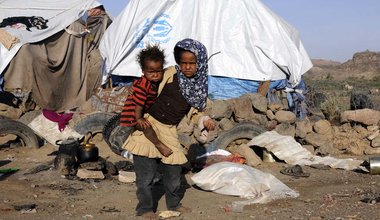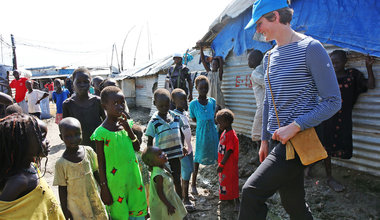Global integration key to attaining development and climate goals, African leaders tell UN Assembly
 Stressing the primacy of the United Nations in forging the collective momentum needed to achieve the Sustainable Development Goals (SDGs) and tackle climate change, Prime Minister Sibusiso Barnabas Dlamini of Swaziland told the General Assembly today that global integration is crucial to transforming the world.
Stressing the primacy of the United Nations in forging the collective momentum needed to achieve the Sustainable Development Goals (SDGs) and tackle climate change, Prime Minister Sibusiso Barnabas Dlamini of Swaziland told the General Assembly today that global integration is crucial to transforming the world.
“Integration has become a universal subject that transcends all aspect s of life. It has been proven that any development achieved by individual countries is because its nationals have purposed to work together as a collective entity,” he said at the Assembly's annual general debate.
“This is true with the United Nations family, whereby the basis of all our success is togetherness and unity in diversity. We have come together in our different sizes and with our diverse cultures, traditions, economies, political and social inclinations to cooperate to become a formidable family ready to address any challenge and achieve any objectives we set ourselves.”
He noted that many countries have succeeded in developing their economies by collectively observing common regional rules to promote a regional agenda.
“Countries have agreed to opening their markets in order to facilitate a high degree of economic activity, boosting trade and job creation, among others,” he said. Peaceful societies have been created through integration. Integration is one of the key ingredients that propel the push to transform our world.”
Mr. Dlamini also urged expanding the 15-member Security Council along the lines of the African Union's Ezulweni Consensus, adopted in Ezulweni, Swaziland, in 2005, which calls for 11 additional seats, including two permanent and two non-permanent seats for Africa, with the new permanent members having the same veto rights as the current five permanent members.
Gabon's Foreign Minister Emmanuel Issoze-Ngondet highlighted the need to develop Africa's energy resources as part of the drive to attain the SDGs and combat climate change. “Two thirds of Africans are deprived of electricity and we must mobilize to address this injustice,” he said.
“Eradication of poverty, protection of the environment, the shared prosperity to which we all aspire are necessities which demand both human and financial resources and greater involvement of the private sector.”
He also noted the need to end the conflicts in Syria and Libya in order to combat the threat of terrorism and stop the unprecedented flow of refugees and migrants resulting from them.
Also addressing the General Assembly today, the Minister for Foreign Affairs of Mauritania, Isselkou Ould Ahmed Izid Bih, stressed that climate change is a major threat to sustainable development, for not only his country, but for others in the region. As such, he expressed the hope that the international community will respect their commitments under the Paris Agreement.
“We have to integrate the environment issue as a cross cutting issue in all of our national policies, particularly those pertaining to economic development, if we are to pursue sustainable development,” he said noting that Mauritania has been able to limit desertification thanks to its efforts.
The Minister also noted the Mauritania’s role, in collaboration with other regional countries and organizations, including the UN, in peace and security matters, and called for crisis such as those in Syria, Libya and Yemen to be resolved through political negotiation.
 UN
UN









